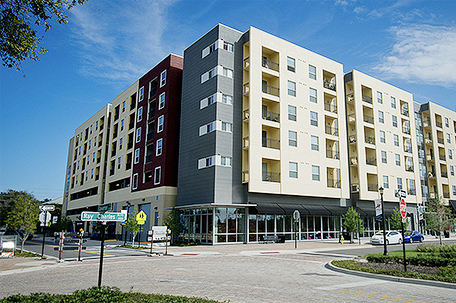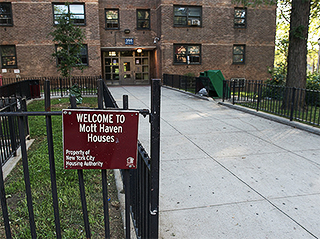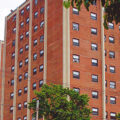
ABOVE PHOTO: Photo: Ella public-housing complex, Tampa (Photo: HUD)
By Drew Johnson
Urban News Service
Tens of thousands of high-income Americans live in low-income housing, according to a federal audit.
More than 25,000 families inhabit federally subsidized housing, even though their incomes exceed limits for public-housing eligibility, according to a probe by the inspector general for the U.S. Department of Housing and Urban Development (HUD).
Critics say these over-income residents cost taxpayers more than $100 million annually and displace disadvantaged citizens who need public housing.
In order to be eligible for public housing, a family must satisfy a formula that combines family size, gross family income and the area’s median income.

Photo: Mott Haven Houses, New York City (Photo: HUD)
Once families move into public housing, however, authorities often let them stay indefinitely, no matter how high their income grows.
As a result, one Manhattan family living in public housing earned $498,000 in 2014 – $431,000 more than the $67,000 income ceiling allowed. The family paid just $1,574 a month for a three-bedroom apartment in the financial district, where equivalent monthly rents exceed $5,000. Like others in HUD’s audit, this family was not named. The report lacks identifying details.
HUD has tried to bar high-income residents from low-income housing. Through a rule issued in 2004, it empowered local public housing authorities to write guidelines that would force tenants to move if their incomes surpassed federal eligibility thresholds.
Few housing programs, however, enforce such regulations. Among the 15 housing authorities in HUD’s audit, all admitted they still let over-income families stay in subsidized housing.
“The bureaucrats in charge of the public housing programs have no incentive to kick people out once they begin earning too much money to live in housing projects,” said David Williams, the president of the Washington, D.C.-based Taxpayers Protection Alliance. “Taxpayers are left paying millions of dollars to subsidize the housing for people who make hefty, six-figure incomes.”
HUD’s audit supports Williams’ perspective. It found that 1,936 families who earned more than $100,000 lived in public housing in 2014.
One family in Lake Linden, Michigan, collected $401,000 in take-home-pay, even though no one earning more than $29,600 was supposed to inhabit its public apartment.
A San Francisco family earned $437,000 a year, according to the HUD investigation, but refused to give up its subsidized housing.
One family with $6.1 million in assets lived in subsidized housing in Puerto Rico intended for a family earning less than $20,000 a year.
This situation is most pronounced in New York City, where 10,250 units managed by the city’s housing authority are occupied by residents whose earnings exceed eligibility limits.
Investigators also found that 1,219 over-income residents dwell in subsidized housing in Puerto Rico.
Taxpayers spend $104 million a year to subsidize people in federal housing, even though they make too much money, according to investigators.
“It is outrageous that taxpayers are footing the bill for millionaires’ housing,” said Rep. Vern Buchanan (R – Florida). “This type of abuse hurts truly needy families.”
About 580,000 low-income families currently await vacancies in federal housing, HUD estimates.
This frustrates Lilia Cruz, who has lived in a Connecticut housing project for 18 years.
“I don’t think it’s fair,” said Cruz, who says she lives on less than $8,000 a year. “It’s ridiculous that those people live in public housing when they can afford to move out and open up a place for someone who really needs a place to live.”
Milan Ozdinec disagrees. As HUD’s deputy assistant secretary for public housing and voucher programs, he sees value in letting affluent residents retain their units, even if they shut out needy families.
“The existence of over-income families aid [public-housing authorities] in meeting their obligation to deconcentrate poverty and also serve to stabilize neighborhoods, because families working towards self-sufficiency serve as good role models to other tenants,” Ozdinec wrote in a June 2015 letter reacting to the inspector general’s findings.
















Leave a Comment